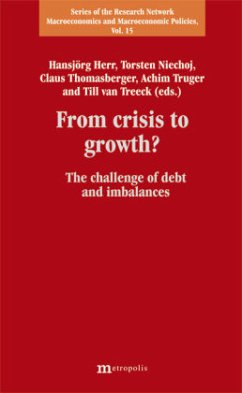Yet, although the causes of the crisis are multifaceted, including a lack of financial market regulation, rising income inequality and global current account imbalances, the current policy debates are dominated by a narrow focus on the so-called public debt crisis in many countries. Judging by the quality of these debates, it would even seem that many politicians see the high public debt levels as the main cause of the crisis, when in fact they are largely a consequence of it. By contrast, the deeper origins of the crisis are still not being properly addressed. The contributions collected in the present book are united by the objective to analyse the issue of public debt in the larger context of macroeconomic and social imbalances. Contents
Contents
A.K. Dutt: Growth, distribution and crises
M. Setterfield: Real sector imbalances and the Great Recession
S. Dullien, H. Herr, C. Kellermann: Towards a social and sustainable growth model
P. Arestis, E. Karakitsos: Economic policy implications of the 'Great Recession'
R. Wray: Imbalances? What imbalances?
C. Thomasberger: Economic imbalances, capitalism and democracy
T. Palley: Explaining global financial imbalances
P. Davidson: The Keynes solution for preventing global imbalances
X. Liu: FDI in China: A sovereign money perspective
A.M. Cunha, D.M. Prates, F. Ferrari-Filho: Can the Brazilian countercyclical policies adopted in 2008-09 be considered Keynesian?
S. Sen: Managing global financial flows at cost of national autonomy: China and India
M. Sawyer: The contradictions of balanced structural government budgets
C. Mathieu, H. Sterdyniak: Do we need fiscal rules?
P. Leão: How to make discretionary fiscal policy counter-cyclical
J. Priewe: European imbalances and the crisis of the European Monetary Union
G. Semieniuk, A. Truger, T. van Treeck: Towards reducing economic imbalances in the euro area?
J. Ferreiro, F. Serrano: The fiscal policy in Spain
Y. Monogios: The ?Tax-gap? perspective of fiscal sustainability in the post-2008 crisis period in Greece
J. Mota, L. Lopes, M. Antunes: The Portuguese economy at the crossroads of the euro and globalization
Contents
A.K. Dutt: Growth, distribution and crises
M. Setterfield: Real sector imbalances and the Great Recession
S. Dullien, H. Herr, C. Kellermann: Towards a social and sustainable growth model
P. Arestis, E. Karakitsos: Economic policy implications of the 'Great Recession'
R. Wray: Imbalances? What imbalances?
C. Thomasberger: Economic imbalances, capitalism and democracy
T. Palley: Explaining global financial imbalances
P. Davidson: The Keynes solution for preventing global imbalances
X. Liu: FDI in China: A sovereign money perspective
A.M. Cunha, D.M. Prates, F. Ferrari-Filho: Can the Brazilian countercyclical policies adopted in 2008-09 be considered Keynesian?
S. Sen: Managing global financial flows at cost of national autonomy: China and India
M. Sawyer: The contradictions of balanced structural government budgets
C. Mathieu, H. Sterdyniak: Do we need fiscal rules?
P. Leão: How to make discretionary fiscal policy counter-cyclical
J. Priewe: European imbalances and the crisis of the European Monetary Union
G. Semieniuk, A. Truger, T. van Treeck: Towards reducing economic imbalances in the euro area?
J. Ferreiro, F. Serrano: The fiscal policy in Spain
Y. Monogios: The ?Tax-gap? perspective of fiscal sustainability in the post-2008 crisis period in Greece
J. Mota, L. Lopes, M. Antunes: The Portuguese economy at the crossroads of the euro and globalization

